Katya B Naidu & Sneha Kupekar in Mumbai
Gunapati Venkata Krishna (GVK) Reddy dislikes creases, be it in his clothes or business. It is not unusual to see the 65-year-old patriarch of GVK Power & Infrastructure often smoothening the creases on his suit.
It is this cautiousness that the six-foot, three-inch Reddy brings to his sprawling business empire - from power to airports and roads.
So, after a deliberate slowdown in business expansion, a period when he made headlines more for spousal generosity (he gifted shares worth Rs 1,640 crore (Rs 16.40 billion) in his flagship company to his wife on her birthday in April this year), the group is now stepping on the gas.
...
Photographs, courtesy: GVK group
GVK Power's strategy for success
Image: GVK Group.The GVK Group wears its cautiousness as a badge. While Reddy himself says his group never takes a risk unless it is completely convinced that the project is good enough, Reddy's "brain trust" and strategist, Group CFO Isaac George, says: "GVK is a conservative group and it will remain conservative - that's our style. We are satisfied with it, it has not done us any harm," he adds. The CFO, who led the company through the period of credit crisis, in fact, takes it as a compliment.
But, the market thinks otherwise. The market capitalisation of competitor GMR is three times that of GVK. Even Lanco's m-cap is two times higher.
GVK Group sources, however, say it is the most profitable. It has been able to generate more cash from its existing projects than anyone else in the sector even though the company did not see as much growth in terms of profitability.
The company had Rs 788 crore (Rs 7.88 billion) cash on its balance sheet as on March 31, 2010. This has increased four times from its free cash at the end of financial year 2008-09, which stood at Rs 156 crore (Rs 1.56 billion).
...
GVK Power's strategy for success
Image: Bangalore Airport.While the jury is out on whether GVK has been extra-cautious, everyone agrees on the fact that the extreme cautiousness has now given way to calculated exuberance.
AirportsGVK has bought 17 per cent stake from its consortium partner L&T in Bangalore Airport for Rs 686 crore (Rs 6.86 billion), and 12 per cent stake from Zurich Airport for Rs 480 crore (Rs 4.8 billion).
Passenger traffic in this airport grew at a robust 18.2 per cent last year and its asset value is pegged at Rs 6,060 crore (Rs 60.60 billion).
"We are planning on expanding this airport immediately. Next year, we will go for a new terminal. We would definitely look at increasing our stake even more," says Reddy. The company plans to apply the same strategy of acquiring majority stake in Mumbai Airport as well, whose asset value is estimated at Rs 11,770 crore.
...
GVK Power's strategy for success
Image: Mumbai Airport.GVK is also planning a serious bid for the Navi Mumbai airport project for which it has a right of first refusal. The company already runs an airport in the country's financial capital, and believes the new one will get as much traffic as they see a latent demand.
"Smaller airport projects mean small business, which will bring in less revenue and profit. If an airport does not have the kind of revenues we want, we will not take it up," says Reddy.
...
GVK Power's strategy for success
Image: Power plans on fast track.The power plans of the company have also been put on a fast-track as it is planning a massive expansion in gas-based power capacity by as much as 1,600 megawatt (Mw). The company plans to add 800 Mw each at two sites in Jegurupadu and Gautami. It has even placed an equipment order for the projects.
These projects are strategically located close to the Krishna Godavari basin where natural gas reserves have been discovered. It is also constructing a 600 Mw coal fired project at Gondwal Sahib, and around 670 Mw in two hydel projects.
The company, which stayed away from the four ultra mega power projects, is now looking to bid for these projects which attract investments as massive as Rs 17,000 crore (rs 170 billion) and above.
...
GVK Power's strategy for success
Image: GVK bullish on road projects.This decision comes after the company's fortunes revived as their gas-based power generation took off thanks to gas supply from KG basin. "We had run into problems as gas was not available for two-and-a-half years. The project was completed but not completely operational. We had to concentrate on sustaining ourselves and resolving issues," says George.
Road projects
The company's first road project, Jaipur-Kishangarh, enjoys an internal rate of return of 30-35 per cent and is a money-spinner. "The sky is the limit for road projects. All the expressways are being connected, and this is another area that will become big in the next 20-30 years. We are not looking at small stuff, we are interested in large investments," says Krishna Reddy. GVK obviously is charged up after recently bagging the Rs 850-crore (Rs 8.5 billion) Deoli-Kota road project.
GVK Power's strategy for success
Image: Traffic moves on a street in front of a thermal power station.Photographs: Amit Dave/Reuters.
Reddy has some 'mega' plans for the company this year. "We are looking at mega road projects. If the location, traffic and revenue match what we expect, we will bid, along with partners," he says.
Today the 17-year-old infrastructure major operates 881 Mw in power generation in India, two airports in Mumbai and Bangalore, and a 364-km road project. GVK's asset base is as much as Rs 50,000 crore (Rs 500 billion).
Peer comparison
GVK always gets dragged in a comparison game with its peers from Andhra - Lanco -and especially, GMR. All three started their infrastructure journey with power in the mid nineties.
Very much as a part of the independent power producer (IPP) wave. All had similar 200-350 Mw operations, but, today, are much bigger and bolder players covering the entire infra value chain.
...
GVK Power's strategy for success
Image: GMR built Hyderabad airport.Even their business models of creating separate verticals for each business line and then unlocking value are similar.
GMR spun off its energy vertical into a subsidiary and roped in a handful of private equity investors, including Singapore-based Temasek and IDFC PE, and has raised $300 million. GVK, too, is known to be in talks with a US-based PE player to sell strategic stake in its energy vertical, to raise as much as Rs 1,000 crore.
On its part, GVK is in the process of restructuring the group, to form a holding company for each of its businesses like roads, ports and airports. "We started off doing many things. At this stage, every portfolio has a number of projects. There is no doubt that we will have to separate them. As these verticals grow, it is better to separate as it becomes easier for us to manage," says Reddy.
...
GVK Power's strategy for success
Image: Mumbai Airport.GMR's operations are global: From airports in Turkey and Male to power projects in Mexico, the Netherlands, UK, Australia and Singapore. It's a worldwide play.
GVK incidentally lost out on the Male airport development bid to GMR. This was the first time that GVK bid for an international project. And now GVK is re-focusing on India.
GVK's global play, however, will be more cautious and conservative.
"We know what happens in India, we understand this market. But in an international situation you should have full knowledge of what happens there. We have financial discipline here with regulations and statutory compliances, and this discipline is helping us in business. If something happens in Greece, damage happens elsewhere," says Reddy.

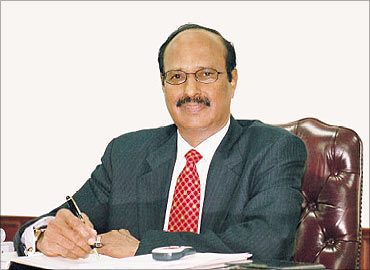
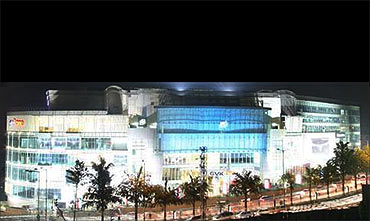
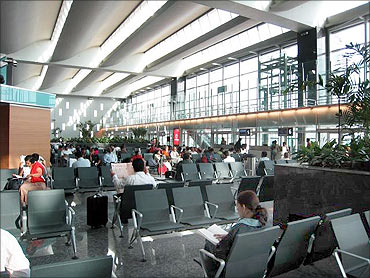
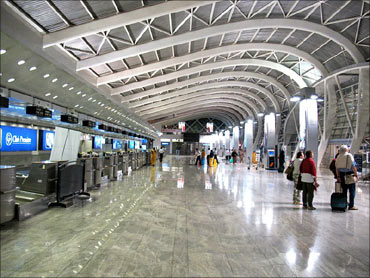
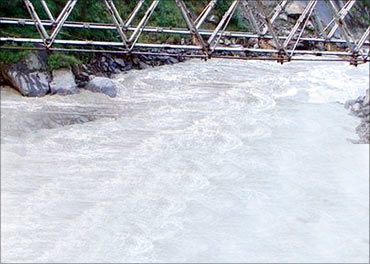

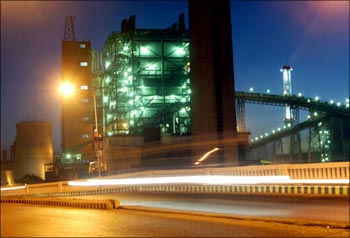
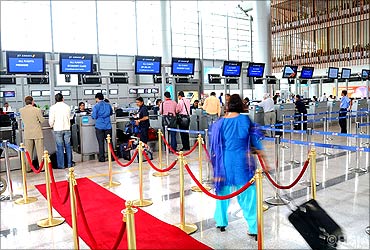
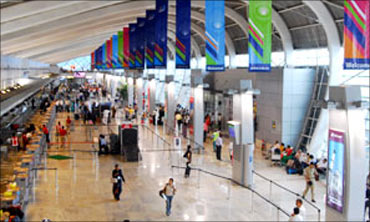
article